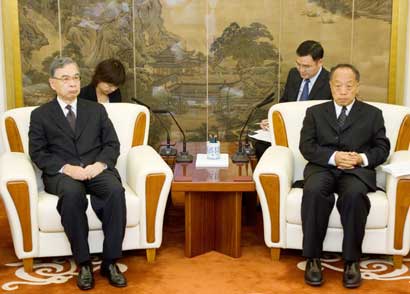Asia-Pacific
Koizumi visits war criminals-honoring shrine
(Xinhua)
Updated: 2006-08-15 15:29
 |
Large Medium Small |
Chinese Foreign Minister strongly protests against Koizumi's shrine visit
Chinese Foreign Minister Li Zhaoxing summoned Japanese Ambassador to China Miyamoto Yuji in Beijing Tuesday, lodging serious and solemn representations, and strong protests against Japanese Prime Minister Junichiro Koizumi's sixth visit to the war criminals-honoring Yasukuni Shrine.
Li said he expresses "strong indignation" and "strong condemnation" over the visit.
 Japanese ambassador to China Yuji Miyamoto (L) listens as China's Foreign Minister Li Zhaoxing reads from a prepared statement in Beijing August 15, 2006, protesting the visit by Japanese Prime Minister Junichiro Koizumi to the Yasukuni Shrine. China accused Koizumi on Tuesday of "wrecking the political foundations of China-Japan relations" by visiting the shrine that honours Japanese leaders convicted as war criminals. [Reuters] |
"China strongly requests Japanese leaders to make efforts to remove political barriers and push the Sino-Japanese ties back to the normal development track at an early date," he said.
Li told Miyamoto that Koizumi's repeated visit to the Yasukuni Shrine is a move that "challenges the international justice" and "tramples the conscience of mankind", Li said.
The class-A war criminals honored in the Yasukuni Shrine were hatchers and directors of Japanese militarists' aggression, and chief criminals responsible for the great calamity imposed on Asia and the world in the modern history, the foreign minister said.
Koizumi insisted on his visit to the shrine despite strong protests from the international community, Japan's Asian neighbors as well as Japanese people.
"His move severely hurt the feelings of the people of the victim countries, and undermined the political foundation of the China-Japan relations," he said.
Noting China is the biggest victim of Japanese militarists' aggression, Li said, "To correctly understand and treat that part of history constituted the political basis for the resumption and development of the China-Japan relations after the war, and the important preconditions for the two countries to face up to the future."
However, Koizumi, sticking to a wrong stance, has repeatedly hurt the feelings of the Chinese people and seriously violated the three Sino-Japanese political documents, Li said.
His move has also made him lose credit to the international community and the Japanese people alike, and undermined Japan's state image and interests, the foreign minister said.
Li said the Chinese government and people attaches great importance to the development of Sino-Japanese friendship and cooperation.
"We will continue to join hands with the Japanese statesmen and people who cherish and engage in the Sino-Japanese friendship, and make efforts for China-Japan long-term friendship and common development, based on the three Sino-Japanese political documents and in the spirit of 'learning from the history and facing up to the future'," he said.